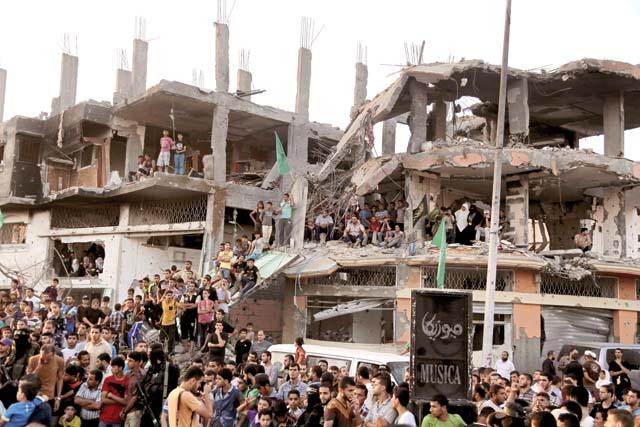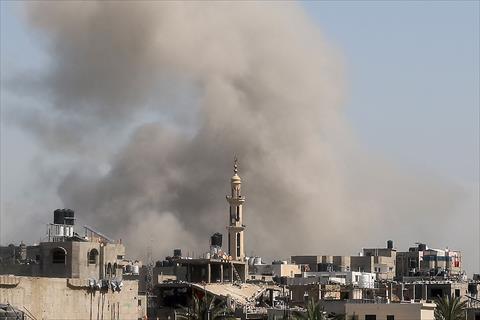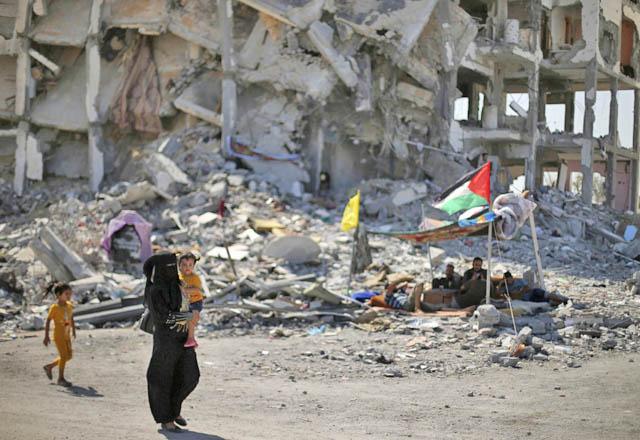You are here
Aid convoys trundle into Gaza as ceasefire holds
By AFP - Aug 28,2014 - Last updated at Aug 28,2014

GAZA CITY — Life in Gaza resumed some semblance of normality Wednesday as a long-term truce took hold following a deal hailed by Israel and Hamas as “victory” in the 50-day war.
Millions in and around the war-torn enclave enjoyed a welcome day of peace during which there were no strikes on Gaza, nor Palestinian rockets fired at Israel, the Israeli army said.
More than 200 tonnes of aid from Saudi Arabia, Oman and Turkey trundled into Gaza through the Rafah border crossing with Egypt, a border official said.
Earlier, a World Food Programme (WFP) aid convoy headed into Gaza from Egypt for the first time since 2007, carrying enough food to last 150,000 people for five days, the Geneva-based agency said.
Jawad Ayad returned to his home after being away for 38 days. Although it was partially destroyed, he said Gaza's "patience" had paid off in the end.
"We have been through difficult days and made a lot of sacrifices, but God has granted us victory," said Ayad, a man in his 50s.
"I hope that this war will be the last."
The peace agreement, effective from 1600 GMT Tuesday, saw the warring sides commit to a "permanent" ceasefire which Israel said would not be limited by time, in a move hailed by Washington, the United Nations and top world diplomats.
Both Israel and the Islamist Hamas movement, the de facto authority in Gaza, hailed the ceasefire as a victory.
'Hamas got nothing'
Under the deal, Israel will ease restrictions on the entry of goods, humanitarian aid and construction materials into Gaza, and expand the offshore area open to Palestinian fishermen to six nautical miles.
But talks on Hamas demands for a port and an airport and the release of prisoners, as well as Israel’s calls to disarm armed groups, are delayed until negotiators return to Cairo within the coming month.
Even ahead of the Cairo talks, Israel staked out a firm stance on how it will approach the upcoming negotiations.
“There will be no port, no airport and no entry of materials that could be used to produce rockets or build tunnels,” said Deputy Foreign Minister Tzahi HaNegbi, a close associate of Prime Minister Benjamin Netanyahu.
“That will be our position which we will present at the negotiations in Cairo,” he told public radio.
Netanyahu later told journalists Hamas had achieved none of its demands.
“Hamas wanted a port and airport in Gaza, the liberation of Palestinian prisoners, the mediation of Qatar and Turkey and the payment of salaries for its employees.
“But it got nothing.”
“We have agreed to help reconstruct the territory for humanitarian reasons, but only under our control,” he said.
Israel has consistently linked Gaza’s reconstruction with its demilitarisation, with former national security adviser Yaakov Amidror saying Hamas must choose.
“Either they will give up reconstruction, or if they want it, they have to give up the dream of being a military force on the ground,” he told journalists.
The European Union welcomed the ceasefire, but said: “A sustainable agreement should address all the root causes of the conflict and bring fundamental change to the situation in Gaza.”
Hamas too claimed victory, saying it caused Israel heavy losses, in a reference to the 64 soldiers killed in the fighting in its biggest military loss since 2006.
“The Palestinian resistance achieved a military victory before the war was over because it stood firm in the face of the arsenal of Zionist terrorism,” the Islamist movement said in a statement.
Crossing changes
The WFP aid convoy was carrying 15,650 food parcels, including ready-to-eat canned meat, canned beans, tea and dates, it said.
A later line of trucks took in 150 tonnes of medicine and medical equipment given by the king of Saudi Arabia, the border official said.
Another 45 tonnes of health supplies arrived from an Oman welfare organisation and Turkey also sent huminatarian aid via Rafah, the official said.
Palestinian officials were expected to meet with their Israeli counterparts on Thursday to discuss procedures at the crossings, Raed Fattuh, head of the Palestinian liaison committee told AFP.
“Karm Abu Salem will operate tomorrow as usual, in the way it was before the Israeli war,” he told AFP, using the Arabic name for the Kerem Shalom commercial crossing at the southernmost end of the Israel-Gaza border.
“The Palestinian and Israeli sides will meet tomorrow to look into everything regarding the movement of merchandise through the crossing.”
Related Articles
Gaza City, Palestinian Territories —Hamas spokesman Basem Naim told AFP Friday that talks over a ceasefire deal between the Palestinian Isla
Jordan has always been there for Palestine, and has proven to be the most generous nation in supporting Gaza under Israeli aggression, Hamas Politburo Chief Khaled Mishaal said on Friday.
A semblance of normal life returned to Gaza on Monday as a 72-hour truce took hold and negotiators sat down in Cairo to seek a permanent end to hostilities.















